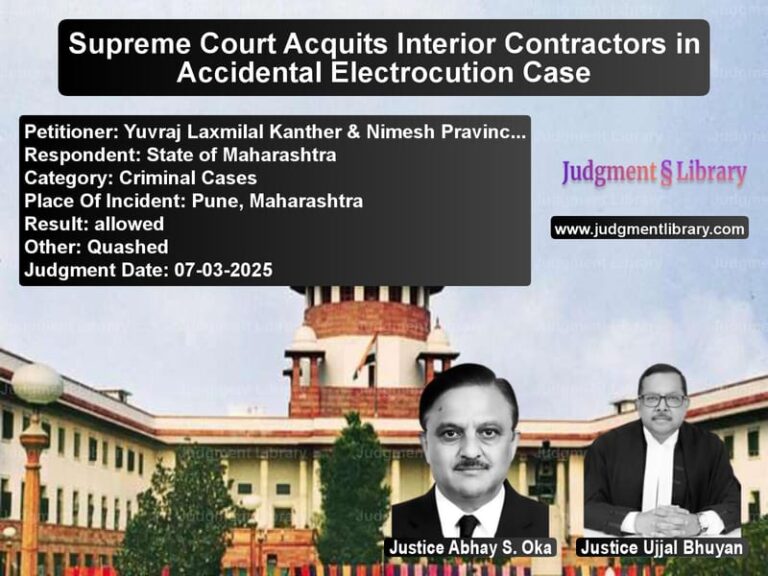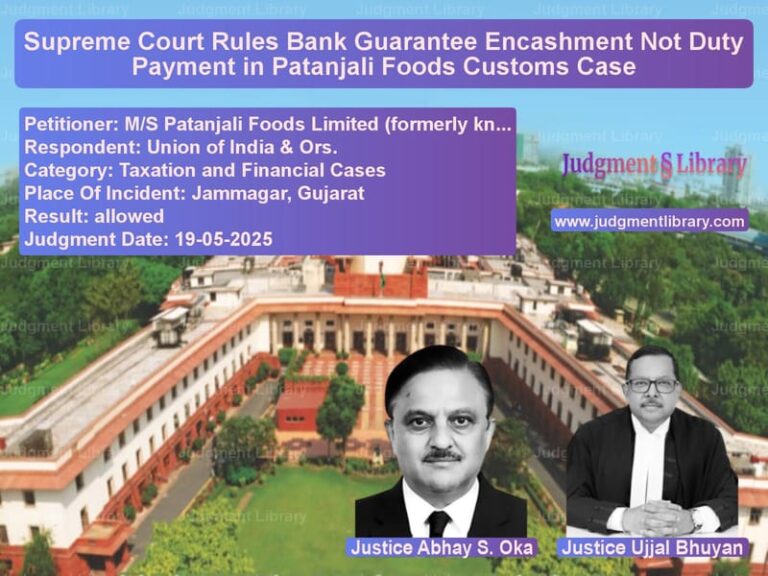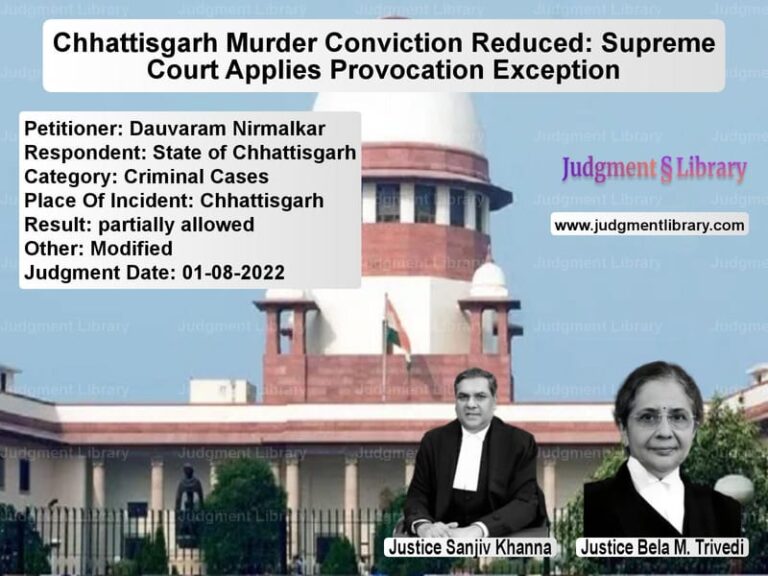Murder Conspiracy and Sentencing: Supreme Court’s Ruling in Padmini Mahendrabhai Gadda Case
The case of Padmini Mahendrabhai Gadda v. State of Gujarat revolves around a gruesome murder, allegations of an extramarital affair, and a conspiracy to eliminate the victim. The Supreme Court was tasked with deciding whether the appellant was guilty under Section 201 of the Indian Penal Code (IPC) for helping in the disappearance of evidence and whether the sentence enhancement ordered by the High Court was justified.
Background of the Case
The case dates back to 1994 when Mahendrabhai, the husband of the appellant Padmini Mahendrabhai Gadda, was found brutally murdered in his home in Ahmedabad. Mahendrabhai ran two health clubs in Ahmedabad. One of his employees, Kishore Thakkar, was accused of having an extramarital affair with Padmini and conspiring with her to kill Mahendrabhai.
On December 12, 1994, Padmini allegedly misled her family about her husband’s whereabouts. Later, her brother, the complainant, discovered Mahendrabhai’s dead body in the bathroom, while Kishore fled half-naked from the scene. Padmini, instead of reporting the crime, left with Kishore, changing locations multiple times before their arrest a month later.
Key Issues Before the Court
- Was Padmini actively involved in the conspiracy to kill her husband?
- Did she knowingly participate in disposing of evidence or screening the offender?
- Was the Gujarat High Court justified in enhancing her sentence from two years to seven years?
- Should the Supreme Court uphold her conviction under Section 201 IPC?
Arguments of the Petitioner (Padmini Mahendrabhai Gadda)
Padmini’s defense, led by senior counsel, argued:
- She had no prior knowledge of Kishore’s plan to murder her husband.
- She was asleep when the crime took place and did not actively participate.
- She remained silent out of fear, as Kishore threatened her and their children.
- After the murder, she did not voluntarily accompany Kishore but was taken against her will.
- The trial court’s sentence of two years was sufficient, and the High Court’s enhancement to seven years was excessive.
Arguments of the Respondent (State of Gujarat)
The prosecution, representing the State of Gujarat, countered:
- Padmini had an ongoing extramarital relationship with Kishore and actively conspired in the murder.
- She deliberately misled her family about Mahendrabhai’s whereabouts on the day of the murder.
- Her silence, even after she had opportunities to report the crime, indicated her complicity.
- She stayed with Kishore for over a month, changing locations multiple times under fictitious names, proving her active involvement.
- Her conviction under Section 201 IPC was justified, and the High Court rightly enhanced her sentence due to the gravity of the offense.
Supreme Court’s Analysis and Judgment
The Supreme Court, led by Justice N.V. Ramana and Justice Prafulla C. Pant, had differing opinions on Padmini’s guilt and sentencing.
Findings of Justice N.V. Ramana
- The prosecution failed to prove that Padmini actively participated in the crime.
- Mere silence, under the threat of an accused, cannot establish guilt under Section 201 IPC.
- There was no conclusive evidence that Padmini took steps to destroy evidence.
- Since the trial court itself noted that she may have acted out of fear, her conviction was unwarranted.
- The High Court’s enhancement of her sentence was unjustified.
- The conviction should be set aside, and Padmini should be acquitted.
Findings of Justice Prafulla C. Pant
- Padmini’s actions, including misdirecting her family and leaving with Kishore for over a month, indicated her involvement.
- Her failure to inform the police and continued association with Kishore were clear signs of an attempt to shield the offender.
- The trial court was correct in convicting her under Section 201 IPC, but the High Court’s sentence of seven years was excessive.
- The conviction should be upheld, but the sentence should be reduced to two years as per the trial court’s ruling.
Final Judgment and Conclusion
Due to the disagreement between the two judges, the case was referred to a larger bench for final adjudication.
This case highlights the complexities in assessing criminal liability, particularly when a person accused of aiding a crime claims to be acting under duress. The ruling also underscores the importance of independent judicial evaluation in cases involving circumstantial evidence.
Don’t miss out on the full details! Download the complete judgment in PDF format below and gain valuable insights instantly!
Download Judgment: Padmini Mahendrabhai vs State of Gujarat Supreme Court of India Judgment Dated 17-07-2017.pdf
Direct Downlaod Judgment: Direct downlaod this Judgment
See all petitions in Murder Cases
See all petitions in Fraud and Forgery
See all petitions in Attempt to Murder Cases
See all petitions in Judgment by N.V. Ramana
See all petitions in Judgment by Prafulla C. Pant
See all petitions in partially allowed
See all petitions in Modified
See all petitions in supreme court of India judgments July 2017
See all petitions in 2017 judgments
See all posts in Criminal Cases Category
See all allowed petitions in Criminal Cases Category
See all Dismissed petitions in Criminal Cases Category
See all partially allowed petitions in Criminal Cases Category







